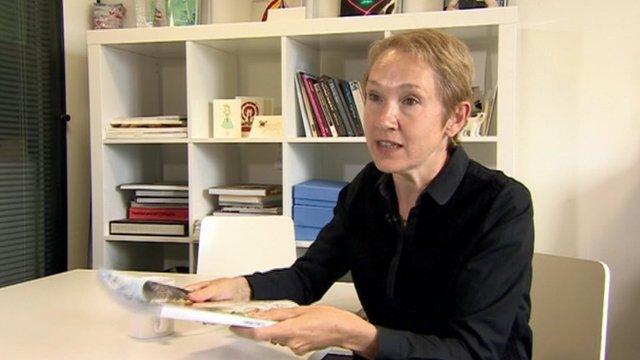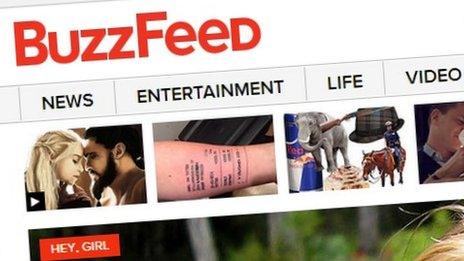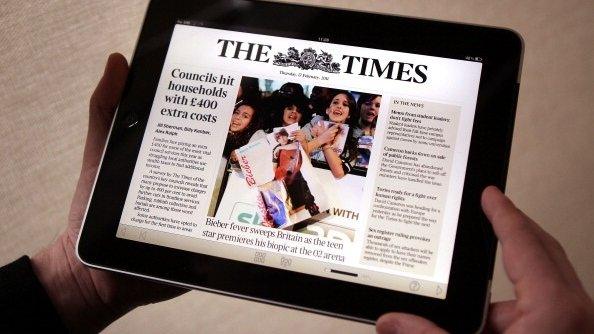Mainstream media 'still dominate online news'
- Published

Many users of digital news services said they also read a printed newspaper
Traditional media organisations remain the dominant source of online news in the UK, according to a new report.
More than half of those polled said they followed the news through an established brand, with just 16% using digital-only sites, such as Buzzfeed and Huffington Post.
However, new media companies were found to be very popular in the US and Japan.
The study also found that just over one in ten people paid for online news content in the past year.
The research, carried out by the Reuters Institute for the Study of Journalism, external at Oxford University, is based on a YouGov survey of more than 18,000 people across 10 countries.
Consumers in the US, UK, Germany, France, Denmark, Finland, Spain, Italy, Japan and urban Brazil were questioned about their news habits.
'Free alternatives'

Just 7% of those polled in the UK said they paid for news in the past year - the lowest of all 10 countries - and only 7% said they would be prepared to pay in the future.
"There is a limited pool of people who are sufficiently interested in news to pay for it when there are free alternatives," said Nic Newman, one of the report's editors.
The top subscription sites in the UK were the Times, Telegraph and Sun newspapers.
The number of people using smartphones or tablets to access news grew significantly, while desktop use dropped, but computers still account for well over half of all browsing.

Times writer Caitlin Moran was named the most influential UK journalist on Twitter
'Smartphone effect'
However, the report found the rise of smartphone use has led to people consuming fewer news sources, with 37% of those polled across all countries saying they accessed just one news brand on their handset.
In the UK, 55% said the same.
"People are short of time on a smartphone," said Mr Newman.
"They come back to the source they rely on most."
He added that there was "limited real estate" on mobile phones and not enough screen space for a variety of brands.
.gif)
However, in general, consumers overwhelmingly preferred news outlets with a range of views over those with a particular political agenda.
Social media
WhatsApp, the messaging app recently acquired by Facebook for $19bn (£11.3bn), emerges as a key social network, with 26% of those polled in Spain saying they used the service for news, and 15% saying the same in Brazil.
Users can send links to news stories instantly on the app, which also allows group messaging.
Facebook itself remains the dominant force in the sector, with 35% of those polled across all countries saying they use the site to access news content.
Twitter is very popular in the UK and US, less so elsewhere, and is eclipsed in all the countries by YouTube.
.gif)

David Sillito, BBC Media Correspondent
Why are you reading this? Did you stumble across it, read it on a home page or was it recommended to you?
The new report makes it very clear that the era of a news agenda driven entirely by editors, TV bulletins and front pages is over.
There's a new class of press baron, Facebook Superfriends or Twitterati, who are increasingly playing a role in driving the news agenda. But there's so much more in this report. Here are my favourite nuggets:
More than 1 in 2 Japanese households still get papers delivered
The UK is bottom of the table in "interest in politics" with just 33%; Germany is on 60%, the US 55%
Women are more interested in political news than men (in the UK 44% to 23%)
Arts and culture stories are least popular in text form but the most popular news videos
Germany (9%) shows least interest in arts news, Brazil (27%) the most

The report also found that the reputation of individual journalists and columnists is almost as important as well-established brands in attracting people to a news source, especially in Spain, Italy and the US.
People said they would be more likely to pay for content that included work by journalists they knew.
The report's authors highlight the launch of recent news organisations in the US by household names, such as Ezra Klein's Vox Media, Felix Salmon's Fusion and Andrew Sullivan's Daily Dish.
Glenn Greenwald, the journalist who became famous for writing about the revelations by Edward Snowden on the extent of US government surveillance, also established his own company, First Look Media.
"Digital and social media seem to be encouraging journalism with a human face," said Mr Newman.
"There is likely to be an economic premium attached to the very best writers."
The report also highlighted the role of Twitter in the UK in bringing readers to news sources. Almost half of all Twitter users in the UK follow at least one journalist. The most influential UK journalists on Twitter were:
Caitlin Moran (the Times)
Jon Snow (Channel 4)
Victoria Coren Mitchell (the Observer, the Guardian)
Robert Peston (BBC)
Nick Robinson (BBC)

The Guardian was the most dominant news brand on Twitter, followed by BBC News and the Economist.
Perhaps surprisingly, video news was fairly unpopular among those surveyed, accounting for as little as 10% of all traffic in some countries.
Younger users said clips took too long to load, while some did not want to pay for viewing content over their mobile network.
Older users wanted to view video on larger screens, and were generally more keen on the written word.
The report is supported by BBC Global News, Google, Ofcom and others.
- Published3 June 2014

- Published7 April 2014

- Published20 June 2013
